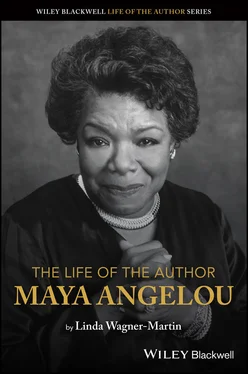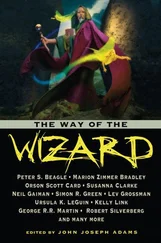Linda Wagner-Martin - The Life of the Author - Maya Angelou
Здесь есть возможность читать онлайн «Linda Wagner-Martin - The Life of the Author - Maya Angelou» — ознакомительный отрывок электронной книги совершенно бесплатно, а после прочтения отрывка купить полную версию. В некоторых случаях можно слушать аудио, скачать через торрент в формате fb2 и присутствует краткое содержание. Жанр: unrecognised, на английском языке. Описание произведения, (предисловие) а так же отзывы посетителей доступны на портале библиотеки ЛибКат.
- Название:The Life of the Author: Maya Angelou
- Автор:
- Жанр:
- Год:неизвестен
- ISBN:нет данных
- Рейтинг книги:4 / 5. Голосов: 1
-
Избранное:Добавить в избранное
- Отзывы:
-
Ваша оценка:
- 80
- 1
- 2
- 3
- 4
- 5
The Life of the Author: Maya Angelou: краткое содержание, описание и аннотация
Предлагаем к чтению аннотацию, описание, краткое содержание или предисловие (зависит от того, что написал сам автор книги «The Life of the Author: Maya Angelou»). Если вы не нашли необходимую информацию о книге — напишите в комментариях, мы постараемся отыскать её.
The Life of the Author: Maya Angelou
The Life of the Author: Maya Angelou
The Life of the Author: Maya Angelou — читать онлайн ознакомительный отрывок
Ниже представлен текст книги, разбитый по страницам. Система сохранения места последней прочитанной страницы, позволяет с удобством читать онлайн бесплатно книгу «The Life of the Author: Maya Angelou», без необходимости каждый раз заново искать на чём Вы остановились. Поставьте закладку, и сможете в любой момент перейти на страницу, на которой закончили чтение.
Интервал:
Закладка:
Marguerite turned more and more inward. She stopped expressing herself even to Bailey. Disastrously cut off from the human world, still feeling that she had some kind of bond with Mr. Freeman, one evening before her mother’s return, she walked to him and sat on his lap. It was something she had seen her mother do numerous times; in her mind, she was trying to make an overture of friendship. At that time he once again used her body for masturbation, leaving her in the chair as he went into the downstairs bathroom. Again, Ritzie knew she could not tell.
On a spring Saturday, following a night when Vivian had not returned home, Mr. Freeman raped Ritzie. Perhaps what Mr. Freeman had read as foreplay came to its inevitable conclusion. Perhaps in his anger at Vivian, he aimed to hurt both the child and her mother. Whatever the cause of the evil, he acted. That he tried to wash away the evidence did nothing to exonerate him. The threats were repeated; the child was in great pain. She experienced divided consciousness; she was completely bewildered. The blood frightened her. This time she told Bailey. Mr. Freeman was arrested; the Baxters were scandalized. But at the back of Ritzie’s mind, and echoed in the responses of the Baxters, was the question of the child’s own possible responsibility: had she encouraged Mr. Freeman? Had she brought this pain on herself?
If this rape had happened in the 21st century, a psychologist might have been found. Medical evaluations would not have been the only care: therapy would have been more important than vaginal healing. But it is 1930s Missouri, and even in cities such as St. Louis, few people consulted psychologists – especially in the case of a child’s having been abused. What our age knows about trauma does not reach backward in time: trauma is that which injures. Repeatedly. Trauma is the unreconcilable injury, the wresting of the power of sanity from a person otherwise viable. Elaine Scarry once said that “physical pain is not only resistant to language but also actively destroys language, deconstructing it into cries and groans. To hear those groans is to witness the shattering of language.” The sheer pain of rape was hardly the end point of the child’s experience. In a definition of trauma, one psychologist says that “trauma, whether initiated by physical abuse, dehumanization, discrimination, exclusion, or abandonment, becomes embedded in both psychic and bodily circuits. Psychoanalytic theory and neurobiological studies explore the difficulty of the recovery process…” Psychiatrist Judith Herman, too, sees any traumatic state as staining a broad swath through an individual’s consciousness. All people, says Herman, depend on their belief that certain people can be trusted. Just as Marguerite trusted Mr. Freeman, she was inordinately betrayed – and, through association, his betrayal was also the betrayal of her mother, her mother in her absence, her mother who had brought the man into their family and their home. How was Ritzie to rebuild that confidence?
One common response to trauma is dissociation. Self-protective, a wounded person, whether wounded psychologically or physically, cannot fixate on the injury. At least part of that person’s reaction must be avoidance. This psychiatrist insists on the need for dissociation, claiming that traumatic experience “can produce lasting alterations to the endocrine, autonomic, and central nervous system… [In compensation, the wounded person creates a mechanism] by which intense sensory and emotional experiences are disconnected from the social domain of language and memory.”
Traumatic events, Herman notes, “shatter the construction of the self that is formed and sustained in relation to others” and “cast the victim into a state of existential crisis.” There is a long-lasting process of grieving, not only for the immediate loss but for “what was never theirs to lose.” Anyone so traumatized by loss may experience “recurrent and intrusive recollections or recurrent distressing dreams.” She then draws from the American Psychiatric Association’s Diagnostic and Statistical Manual of Mental Disorders to add the other symptoms of “social withdrawal, shame, despair, hopelessness.”
Cathy Caruth provides an even wider perspective as she defines trauma as “an overwhelming experience of sudden or catastrophic events in which the response to the event often occurs in the often delayed, uncontrolled, repetition of … intrusive phenomena…” Caruth adds that, perhaps more permanently, trauma is “a shock that appears to work very much like a bodily threat but is in fact a break in the mind’s experience of time.”
While Marguerite defined her traumatic event as the rape by Mr. Freeman, it seems, judging from these definitions of trauma, that an even earlier traumatic event for her as a very young child was the abandonment by her parents. Traveling the 1,600 miles by train, only to reach the tiny Arkansas town where her grandmother and uncle lived, was itself a trauma – for both the Johnson children. It seems likely that only the completely welcoming response by both Annie Henderson and Uncle Willie allowed them to overcome their feelings of great, immeasurable, loss.
Angelou does not recall having the horrifying dreams when she slept with Momma in the small Stamps bedroom. Again, being moved into a new and strange situation after their distant father drove them the 500 miles to St. Louis, so that they could be cared for by their mother, triggered both Bailey’s stammering and Ritzie’s nightmares and bed-wetting. Two major life-changing events before either child turns ten replicates the stories of children abandoned by war, or immigration, or other forced displacements. In those cases, however, the child would be part of a company of other children so treated: in that companionship might lie comfort. Displacement, abandonment, fear of circumstances, mistrust of the adults who should be caring for them – these are the traumatic events that both Bailey and Marguerite lived through early in their young lives.
Facts do not give an entire story. Being driven five hundred miles by a father they felt betrayed by – When would they get to California? When would they live with him and not their mother? – does not reveal the surrounding of loneliness that marked being in St. Louis. The novelty of being driven in cars, or using an indoor toilet, or having ice from their own icebox was only that – a short-lived novelty. Living in Grandmother Baxter’s house did not mean that anyone else living there cared about them: occasionally, one of the uncles might pitch some balls to them, or their mother would visit, or Grandmother Baxter would give them meals. But they saw themselves as clear impositions on the people living in the busy household.
What followed Marguerite’s narrative of Mr. Freeman’s attack only added to these layers of trauma. Eventually there was a trial. Wearing her best outfit, even though it was now too short for her, Ritzie takes the witness stand, and it is her testimony that convicts Mr. Freeman. Jailed for one day in advance of his formal sentencing, Mr. Freeman is released – only to be discovered, dead from a brutal beating, rumored to have been administered by the Baxter boys. Years later, when Marguerite tells the story of Mr. Freeman in I Know Why the Caged Bird Sings , she claims that her lingering withdrawal from life, expressed through her years of chosen muteness, results from her thinking that her testimony has killed her mother’s lover. And she admits that she finds herself complicit in the sexual events because she enjoyed his holding her – so she had lied as she testified in court.
I had sold myself to the Devil and there could be no escape. The only thing I could do was to stop talking to people other than Bailey. Instinctively, or somehow, I knew that because I loved him so much I’d never hurt him, but if I talked to anyone else, that person might die too. Just my breath, carrying my words out, might poison people and they’d all curl up and die like the black fat slugs that only pretended. I had to stop talking. 1
Читать дальшеИнтервал:
Закладка:
Похожие книги на «The Life of the Author: Maya Angelou»
Представляем Вашему вниманию похожие книги на «The Life of the Author: Maya Angelou» списком для выбора. Мы отобрали схожую по названию и смыслу литературу в надежде предоставить читателям больше вариантов отыскать новые, интересные, ещё непрочитанные произведения.
Обсуждение, отзывы о книге «The Life of the Author: Maya Angelou» и просто собственные мнения читателей. Оставьте ваши комментарии, напишите, что Вы думаете о произведении, его смысле или главных героях. Укажите что конкретно понравилось, а что нет, и почему Вы так считаете.












